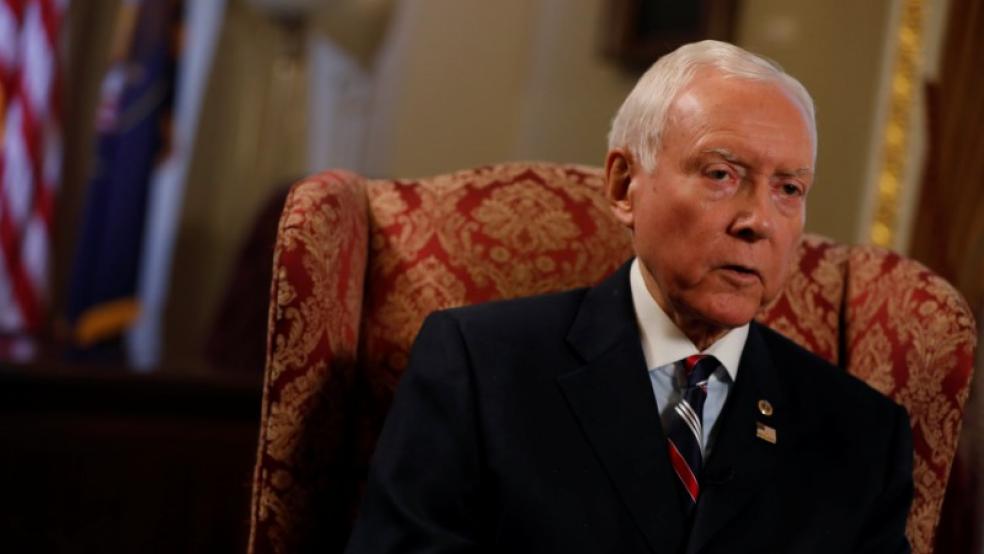Senate Republican leaders are considering a one-year delay in the implementation of a major corporate tax cut, four people familiar with a draft of the legislation said, a move that would postpone a centerpiece of the GOP tax plan in order to comply with Senate rules.
This change would lower the corporate tax rate from 35 percent to 20 percent in 2019, not 2018 as currently constructed by a House GOP bill.
To ensure that companies don’t postpone major investment decisions and wait for the lower rate in 2019, Senate Republicans are considering allowing companies to immediately deduct capital investments in 2018 from their taxable income, the people said.
The people spoke on condition of anonymity because they were not authorized to discuss sensitive deliberations.
The process could change if President Trump demands the corporate rates going into effect immediately, two of the people said. That’s one reason discussions remain fluid and Senate Republican leaders are currently looking at different ways to implement the tax cuts. No decisions have been made, all of the people familiar with the negotiations said.
Many of these details and decisions will come into sharper focus as soon as Thursday, when Senate Finance Committee Chairman Orrin Hatch (R-Utah) is expected to introduce his version of the tax cut bill.
Hatch said on Tuesday that his goal was to make the 20 percent rate cut permanent and immediate but it was still being discussed.
“I hope we can get there, that’s for sure,” Hatch said Tuesday.
The House Ways and Means Committee is expected to approve its version of the tax cut bill on Thursday and hold a vote in the full House of Representatives next week.
Focus on the House bill, which was introduced last week, has drawn interest away from Senate deliberations, but that is expected to soon change.
There are other major differences between the House bill and what Senate lawmakers are preparing to introduce.
House Republicans have ensured that Americans will be able to deduct up to $10,000 in local property taxes from their federal taxable income, but that provision is not expected to be in the Senate bill unless a last-minute change is made.
Senate Republicans also do not plan to collapse the seven income tax brackets that families and individuals pay down to four brackets, another major difference from the House GOP approach.
The Senate plan is expected to keep roughly seven brackets, though they are expected to either lower the tax rates paid by some of these brackets or change what income levels pay certain brackets.
There will be a number of other changes to the taxes that certain businesses pay and the way companies are taxed on overseas earnings. Senate negotiators aren’t planning to include a temporary $300 “family flexibility credit” contained in the House bill. It’s this credit, which would expire after five years, that has fueled criticism that the House bill would eventually lead to higher taxes for some middle class families.
Much of the focus of the tax debate so far though has revolved around benefits for businesses. The House GOP bill proposed slashing the corporate tax rate from 35 percent to 20 percent in beginning in 2018, and the Joint Committee on Taxation estimated that this change would lead to a drop in federal revenue of $108 billion in the first year.
That means a decision by Senate Republicans to delay the tax cut could end up saving the government money in the near term, but it’s difficult to determine how much because companies would likely change their approach to try and take advantage of the lower rate in 2019.
Still, a decision on delaying the implementation of the corporate rate has not been made, the people said. House Ways and Means Committee Chairman Kevin Brady (R-Texas), in writing his legislation, was considering having the corporate tax rate cut phase out after eight years but made a change the night before the bill was introduced to effectively make it permanent.
Several Senate Republicans are trying to pressure Hatch and other GOP leaders to make a number of other changes to the legislation to avoid criticisms that have been leveled at the House legislation.
Sen. Ted Cruz (R-Texas) said on Tuesday that the House tax bill could end up raising taxes on some middle-class Americans, and he pushed for assurances that the Senate bill would lower everyone’s taxes.
Similarly, Sens. Marco Rubio (R-Fla) and Mike Lee (R-Utah) are pushing for an expansion of the child tax credit beyond what was introduced in the House. They have called for raising the child tax credit from $1,000 to $2,000. The House bill would raised the credit to $1,600.
Senate GOP leaders are treading carefully with changes, mindful that they have a slim 52-48 majority in their chamber and need to keep their caucus unified.
This article originally appeared at The Washington Post. Read more from The Washington Post:
Trump Woos Democrats as Conservatives Demand Changes to House GOP Tax Bill
Senate Moves Toward Mandatory Anti-Harassment Training for Members, Staff
Fact Check: Does the Estate-Tax Hurt Farmers and Small Businesses?
Guess What: Republicans May Be About to Raise Your Taxes
Senators Launch Bipartisan Push to Enforce Existing Background Checks Law





